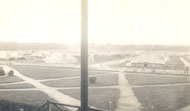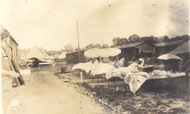In Her Words
Letter from Julia C. Stimson to her family, June 17, 1917
Rev. Henry A. Stimson, father of Base Hospital 21 chief nurse Julia C. Stimson, compiled his daughter’s letters to her family during the First World War into the book, Finding Themselves. Published in 1918 (before the end of the war), Finding Themselves tells of the experiences and gradual changes in the nurses as they “found themselves” through days and nights of unrelenting and difficult service.
After two weeks in England, members of Base Hospital 21 crossed the English Channel and traveled by motor ambulances and French troop trains to Rouen, the center of the southern line of British hospitals in France.
Base Hospital No. 21 was assigned to No. 12 General Hospital of the British Expeditionary Force. To prepare for the tasks ahead, the Washington University medical group observed the methods used in British military hospitals. However, the St. Louis group did not know that their unit, equipped to handle a 500-bed hospital, had been scheduled to take over a 1,300-bed hospital.
Rouen, France
Sunday, June 17, 1917
We have been told in our instructions about letter-writing that we may now state where we are. So now you can all know definitely just where we are. We got our first mail from home day before yesterday, and I can tell you there was great excitement. It is just a month to-day since we left St. Louis and it seems like a year. The latest date of any of my letters was May 27th. But now that the letters have actually begun to come we feel most hopeful that we are not entirely cut off from our friends. It has been a rather dreary feeling to know that up to now, none of you knew where we were or where we were going, but soon we ought to be in regular communication.
We have been here just a week to-night and are beginning to get over our strangeness. We have learned much of our duties and do not now feel that we can never learn them all. All the nurses have their regular places of duty and are getting to know their patients, and what to do for them. Fortunately for them we have not received any new convoys of men during the week, but we have been sending some out every day or night; but in a few days, after we are a little more accustomed to our duties, we shall begin to get in more wounded by the hundred. There are only five or six of the English nurses left here with us, and they are to go this week, we understand. The Matron, who is a most pleasant and helpful person, is to stay here another week, which gives me the shivers, for two weeks is an awfully short time in which to learn the ropes, and all this first week I have not been doing much more than attend to my nurses’ work and their quarters, equipment, etc. But to-morrow I am going to retire to the Matron’s office and stay there. One of my little jobs is to hire cooks and maids for the nurses’ mess and quarters, and I am also hunting a stenographer. Between 40 and 50 V.A.D.’s [Voluntary Aid Detachments] are to stay on with us here, and we are mighty glad to have them, for they are splendid. I understand that our C.O. (Commanding Officer) has cabled home, or is going to cable home as soon as he has proper British authority to do so, for more help for this hospital. I have said that I want 40 more nurses and 25 carefully picked nurses’ aids. I think Miss Bridge [Helen L. Bridge, the acting superintendent of the Washington University Training School for Nurses] could pick out the ones that are the most capable and the most adaptable and the most willing to endure difficulties and do without luxuries and even some comforts. I feel quite sure that there are 25 of that kind among the large number that we trained these past months. I do hope that the Red Cross will give the authority for them to come out with the regular nurses. . . .
Amputations are being done almost every day. Yesterday I went down to the “Theater Hut” to see how our nurses were going to handle a very bad case, for the “Theater Sister” is to be taken away soon. Our people at home would marvel to see what fine work can be done when all the water used has to be heated on top of a small oil stove and all the instruments boiled the same way. The poor boy whose leg had to be amputated was in such bad shape, he could have only the minimum of a general anesthetic, but local anesthesia was given. Besides having both legs badly hurt, his lower back is in terrible shape from injury; after the operation he was put on his face on his bed. Before eight o’clock one of the nurses held his head up so he could have a smoke! And this morning he says he is “in the pink,” which means feeling fine. It is perfectly wonderful, their fortitude, and it is making us all so ashamed for all the complaining we have done. Their bravery is harder to bear than anything else. . . .
. . . According to the accounts of the very cold weather they had here last year our patients and any patients in the neighborhood are going to need all the warm knitted things they can get. Nurses say the solutions in their bottles froze in the tents and their first early morning duties were to thaw out the bottles. We hear that this hospital is to be hutted before the Autumn, which will be much better for the winter, but even then there will not be any steam heat. When I have the Matron’s office, which is the jockey-room of the grandstand of this old race course, I shall have a large table and some shelves, also a little stove for cold days. We are all so delighted and interested to hear from Elsie’s letter that more Units are being ordered out. And we are all so glad we were in the first lot. . . .
Ruth C- has just been in to see me a moment. She is on night duty and is working very hard. She says there never in the world were such wonderful patients, that no matter how much they are suffering they are “quite all right, thank you, Sister,” and they won’t ask for things, and when she asks them if they are in pain, they say, “Not too much, Sister.” The first night she says she went all to pieces, but nobody saw her; now she too is getting steadier. That first night she was responsible for 90 men, many of whom were in the most awful condition. It was no wonder that it got on her nerves a bit. She was so much interested in my letters from you, as she has had no word from St. Louis, in fact no letter at all as yet. I can really see very little of her since I am in charge and so much in the midst of the group all the time. In London, Miss Dunlop and I went to everything together, and here the Matron and I go in pairs, or my own assistant, Miss Taylor, and I. From a personal point of view there are lots of disadvantages in being the head. I have to be on show all the time and always have to meet people and be sociable and go to all the functions, and I hate having things better than the rest of my people. For instance, our table in the mess hall has a tablecloth instead of oilcloth, and sometimes we have little extra things like strawberries when the others don’t. By and by things won’t have to be that way. But the Matrons here are very much honored and set apart and kowtowed to in a way that disturbs our democratic spirit.
. . . It is my job of course to keep before my people the why of our coming and to keep their spirits up. As the director said this morning, we must never be discouraged or depressed, that our biggest job is to keep our people full of enthusiasm. Sometimes it is hard if one’s own head aches, but it really is not hard for those of us who understand the meaning of our being here. . . .
Next letter from Julia Stimson to her family (July 25, 1917)>>
Return to Letters & Memos (In Her Words)
Return to In Her Words
Back to Top


